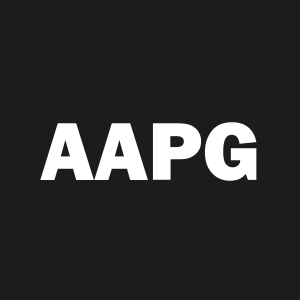EHA 2025 | Multiple Studies Report Encouraging Data of Olverembatinib in Ph+ ALL
Rhea-AI Summary
Positive
- Olverembatinib achieved 100% overall survival rate at 18 months when combined with blinatumomab
- High complete remission rate of 97.3% with VP regimen in first-line Ph+ ALL treatment
- Complete molecular response rate of 78.6% when combined with inotuzumab ozogamicin
- 76.9% complete remission rate in treating myeloid/lymphoid neoplasms with FGFR1 rearrangement
- APG-5918 showed complete tumor regression at 30 mg/kg with 100% overall response rate in preclinical studies
Negative
- None.
News Market Reaction
On the day this news was published, AAPG gained 1.97%, reflecting a mild positive market reaction.
Data tracked by StockTitan Argus on the day of publication.
ROCKVILLE, Md. and SUZHOU, China, June 15, 2025 (GLOBE NEWSWIRE) -- Ascentage Pharma (NASDAQ: AAPG; HKEX: 6855), a global biopharmaceutical company dedicated to addressing unmet medical needs in cancers, announced that results from 13 studies of its core assets, including the novel drug olverembatinib (HQP1351) and the investigational EED inhibitor APG-5918, have been reported at the 2025 European Hematology Association (EHA) Annual Congress.
Notably, in multiple studies presented at this year’s EHA Annual Congress, the third-generation tyrosine kinase inhibitor (TKI) olverembatinib showed broad therapeutic potential and demonstrated particular clinical benefit in the treatment of Philadelphia chromosome-positive (Ph+) acute lymphoblastic leukemia (ALL). According to the results, olverembatinib demonstrated high complete remission (CR) and complete molecular response (CMR) rates, as well as favorable tolerability in the first-line treatment of newly diagnosed and relapsed/refractory Ph+ ALL, and specific subtypes of some hematologic malignancies (e.g., myeloid/lymphoid neoplasm with FGFR1 rearrangement). Furthermore, studies on various combinations of olverembatinib (with venetoclax plus azacitidine, the VP regimen, blinatumomab, or inotuzumab ozogamicin) have shown encouraging results that revealed olverembatinib’s potential in offering more treatment options and improved long-term prognoses to patients with Ph+ ALL.
In addition, a preclinical study of the investigational EED inhibitor APG-5918, another key asset in Ascentage Pharma’s pipeline, was featured in a poster presentation at the Congress. These data showed the potent antitumor activity of APG-5918 in T-cell lymphoma and support further clinical development of the agent.
Highlights of select abstracts presented at EHA 2025 are as follows (for detailed results from all 13 studies of the company's assets, please visit the official EHA website):
Efficacy and Safety of Regimen with Olverembatinib and Blinatumomab for the Frontline Treatment of Ph-Positive or Ph-Like Acute Lymphoblastic Leukemia
- Abstract#: PS1367
- Format: Poster Presentation
- Principal Authors: Prof. Hongsheng Zhou, Nanfang Hospital, Southern Medical University; Xiuli Xu, Nanfang Hospital, Southern Medical University
- Highlights:
- This is a single-arm, single-center, prospective study that assessed the clinical experience with olverembatinib in combination with blinatumomab as a first-line treatment for patients with Ph+ or Ph-like ALL.
- Results from this study show that with a median follow-up duration of 17 months, all patients achieved CR following one cycle of treatment. At 18 months, the overall survival (OS) rate was
100% and the event-free survival (EFS) rate was91.6% . The regimen was well tolerated and no patient experienced cardiovascular events. Notably, administration of olverembatinib and blinatumomab was not interrupted throughout the treatment course with no dose reduction required. - These findings suggest that the combination of olverembatinib and blinatumomab offers promising clinical benefits and an optimal safety profile in patients with Ph+ or Ph-like ALL, thus representing a promising chemotherapy-free treatment option for patients with Ph+ ALL.
Combination of Olverembatinib and VP Regimen as First-Line Therapy for Adult Patients with Philadelphia Chromosome-Positive Acute Lymphoblastic Leukemia: A Single-Arm, Multicentre, Phase 2 Trial
- Abstract#: PS1372
- Format: Poster Presentation
- Principal Authors: Prof. Jie Jin, The First Affiliated Hospital, Zhejiang University School of Medicine; Dr. Gaixiang Xu, The First Affiliated Hospital, Zhejiang University School of Medicine
- Highlights:
- This single-arm, multicenter Phase II study assessed the efficacy and safety of olverembatinib in combination with the VP (vindesine+prednisone) regimen (OVP) in the first-line treatment of adult patients with Ph+ ALL.
- Results from this study showed that in patients treated with the OVP induction therapy, the overall response rate (ORR) was
100% , the CR rate was97.3% , and89.2% (33/37) of patients achieved CMR within 3 treatment cycles. The 2-year OS and progression-free survival (PFS) rates were96.3% and96% , respectively. - These findings suggest that the OVP regimen is effective in achieving a high CMR rate in the early treatment of patients with newly diagnosed Ph+ ALL, with surprisingly few toxic effects and good tolerability, thus representing a potential new treatment option in the first-line setting.
Efficacy and Safety of the Third-Generation Tyrosine Kinase Inhibitor Olverembatinib in Combination with Inotuzumab Ozogamicin for the Treatment of Adult Philadelphia Chromosome-Positive Acute Lymphoblastic Leukemia Patients With Relapsed Disease or Persistent Minimal Residual Disease Bridging to Hematopoietic Stem Cell Transplantation: A Phase II Study
- Abstract#: PS1387
- Format: Poster Presentation
- Principal Author: Erlie Jiang, Institute of Hematology & Blood Diseases Hospital, Chinese Academy of Medical Sciences & Peking Union Medical College; Xiaoyu Zhang, Institute of Hematology & Blood Diseases Hospital, Chinese Academy of Medical Sciences & Peking Union Medical College
- Highlights:
- This is an open-label, single-center Phase II study that evaluated the efficacy and safety of olverembatinib in combination with inotuzumab ozogamicin (INO) in patients with Ph/BCR-ABL1+ ALL who had relapsed or persistent MRD after at least three rounds of chemotherapy.
- Results from this study show that after receiving the treatment, all patients achieved hematologic CR, 11 patients achieved CMR, with an overall CMR rate of
78.6% and an MRD-negativity rate of100% .64.3% (n=9) of patients successfully underwent bridged allogeneic hematopoietic stem cell transplantation (allo-HSCT). The 2-year OS and relapse-free survival (RFS) rates were 88.2 ±15.2% and 62.9 ±17.9% , respectively. - These findings suggest that olverembatinib in combination with INO can achieve deep molecular responses and was well tolerated in patients with Ph+ ALL who had relapsed disease or persistent MRD-positivity.
A Phase 2 Study of Olverembatinib for the Treatment of Myeloid/Lymphoid Neoplasms with FGFR1 Rearrangement
- Abstract#: PF390
- Format: Poster Presentation
- Principal Authors: Prof. Suning Chen, The First Affiliated Hospital of Soochow University; Wenzhi Cai, The First Affiliated Hospital of Soochow University
- Highlights:
- This is a Phase II study that evaluated the efficacy and safety of olverembatinib for the treatment of myeloid/lymphoid neoplasms with FGFR1 rearrangement (MLN-FGFR1).
- Results show that in the 13 patients who were analyzed for efficacy, 10 (
76.9% ) achieved CR/complete hematologic response (CHR), among whom 1 achieved complete cytogenetic response (CCyR, by a patient who received olverembatinib alone) and 1 patient achieved CMR at 2 months’ evaluation. - In this study, olverembatinib showed a promising CR/CHR rate and favorable tolerability in MLN-FGFR1, potentially enabling allo-HSCT in greater numbers of eligible patients. These findings revealed an effective targeted therapy for MLN-FGFR1, a rare hematologic malignancy with a poor prognosis that currently lacks standard-of-care treatment.
Embryonic Ectoderm Development (EED) Inhibitor APG-5918 Exhibits Potent Antitumor Activity and Synergizes with Histone Deacetylase Inhibitor Tucidinostat in Preclinical T-Cell Lymphoma (TCL) Models
- Abstract#: PS1993
- Format: Poster Presentation
- Principal Author: Dr. Eric Liang, Ascentage Pharma Group Inc.
- Highlights:
- APG-5918 demonstrated potent inhibitory effects on the proliferation of TCL cell lines in vitro, showing superior activity compared to other EZH and EED inhibitors. Its combination with tucidinostat synergistically suppressed cell proliferation.
- APG-5918 induced dose-dependent apoptosis and cell cycle arrest in TCL cells.
- In a HuT102 cell line-derived xenograft (CDX) model, APG-5918 exhibited significant, dose-dependent antitumor activity, achieving complete tumor regression at 30 mg/kg with a
100% ORR. Its combination with tucidinostat synergistically enhanced antitumor activity. - Mechanistically, APG-5918 modulated PRC2 complex and induced apoptosis and cell cycle arrest. Combination with tucidinostat further enhanced these effects.
- These findings provide strong rationale for the clinical development of APG-5918, both as a monotherapy and in combination with HDAC inhibitors, for TCL.
*Olverembatinib and APG-5918 are investigational compounds and have not been approved by the U.S. FDA.
About Ascentage Pharma
Ascentage Pharma (NASDAQ: AAPG; HKEX: 6855) is a global biopharmaceutical company dedicated to addressing unmet medical needs in cancers. The company has built a rich pipeline of innovative drug candidates that includes inhibitors targeting key proteins in the apoptotic pathway, such as Bcl-2 and MDM2-p53 and next-generation kinase inhibitors.
The lead asset, olverembatinib, is the first novel third-generation BCR-ABL1 inhibitor approved in China for the treatment of patients with CML in chronic phase (CML-CP) with T315I mutations, CML in accelerated phase (CML-AP) with T315I mutations, and CML-CP that is resistant or intolerant to first and second-generation TKIs. It is covered by the China National Reimbursement Drug List (NRDL). The Company is currently conducting an FDA-cleared, global registrational Phase III trial, or POLARIS-2, of olverembatinib for CML, as well as global registrational Phase III trials for patients with newly diagnosed Ph+ ALL and SDH-deficient GIST patients.
The second lead asset, lisaftoclax, is a novel Bcl-2 inhibitor for the treatment of various hematologic malignancies. The NDA for the treatment of relapsed and/or refractory CLL and SLL was accepted with Priority Review designation by China’s National Medical Products Administration. The Company is currently conducting an FDA-cleared, global registrational Phase III trial, or GLORA, of lisaftoclax in combination with BTK inhibitors for patients with CLL/SLL previously treated with BTK inhibitors for more than 12 months with suboptimal response, as well as global registrational Phase III trials for patients with newly diagnosed CLL/SLL, AML, and MDS.
Leveraging its robust R&D capabilities, Ascentage Pharma has built a portfolio of global intellectual property rights and entered into global partnerships and other relationships with numerous leading biotechnology and pharmaceutical companies, such as Takeda, AstraZeneca, Merck, Pfizer, and Innovent, in addition to research and development relationships with leading research institutions, such as Dana-Farber Cancer Institute, Mayo Clinic, National Cancer Institute and the University of Michigan. For more information, visit https://ascentage.com/
Forward-Looking Statements
This press release includes forward-looking statements within the meaning of the Private Securities Litigation Reform Act of 1995 and Section 27A of the Securities Act of 1933, as amended, and Section 21E of the Securities Exchange Act of 1934, as amended. All statements, other than statements of historical facts, contained in this press release may be forward-looking statements, including statements that express Ascentage Pharma’s opinions, expectations, beliefs, plans, objectives, assumptions or projections regarding future events or future results of operations or financial condition. These forward-looking statements are subject to a number of risks and uncertainties as discussed in Ascentage Pharma’s filings with the SEC, including those set forth in the sections titled “Risk factors” and “Special note regarding forward-looking statements and industry data” in its Registration Statement on Form F-1, as amended, filed with the SEC on January 21, 2025, and the Form 20-F filed with the SEC on April 16, 2025, the sections headed “Forward-looking Statements” and “Risk Factors” in the prospectus of the Company for its Hong Kong initial public offering dated October 16, 2019, and other filings with the SEC and/or The Stock Exchange of Hong Kong Limited we made or make from time to time that may cause actual results, levels of activity, performance or achievements to be materially different from the information expressed or implied by these forward-looking statements. The forward-looking statements contained in this presentation do not constitute profit forecast by the Company’s management.
As a result of these factors, you should not rely on these forward-looking statements as predictions of future events. The forward-looking statements contained in this press release are based on Ascentage Pharma’s current expectations and beliefs concerning future developments and their potential effects and speak only as of the date of such statements. Ascentage Pharma does not undertake any obligation to update or revise any forward-looking statements, whether as a result of new information, future events or otherwise.
Contacts
Investor Relations:
Hogan Wan, Head of IR and Strategy
Ascentage Pharma
Hogan.Wan@ascentage.com
+86 512 85557777
Stephanie Carrington
ICR Healthcare
Stephanie.Carrington@icrhealthcare.com
+1 (646) 277-1282
Media Relations:
Sean Leous
ICR Healthcare
Sean.Leous@icrhealthcare.com
+1 (646) 866-4012







